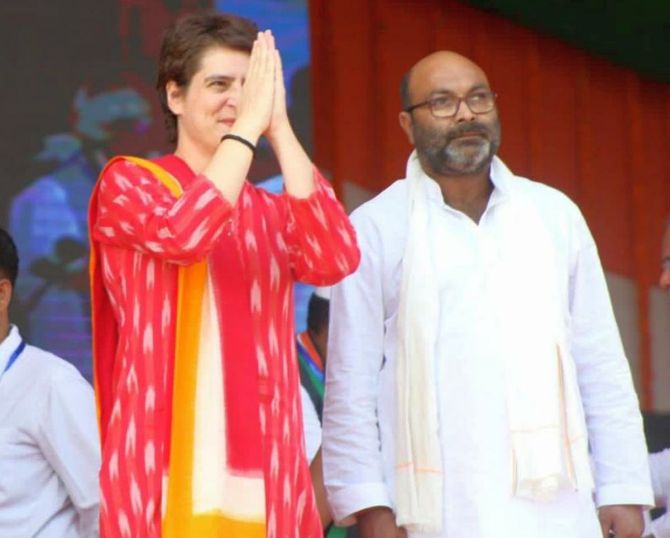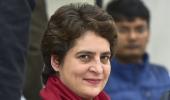'About 90 per cent of our netas have no loyalty and will go with the winner.'
Radhika Ramaseshan reports.

The Congress in Uttar Pradesh went through one of its many convulsions in 2019 after Priyanka Gandhi Vadra assigned the charge of the state to Ajay Kumar Lallu, a former student activist, at the Kisan PG College, Seorahi, Kushinagar and one of the seven MLAs the party has.
For Priyanka and her advisers, Lallu's choice marked a'radical' departure from the arbitrary manner in which previous state presidents were appointed, depending largely on their loyalty to the Delhi brass.
Lallu was perceived as a 'street fighter', and importantly, the first president from a backward caste, the Madheshia-Vaishya.
From day one, he was isolated in the state apparatus.
Priyanka expelled 10 veterans who publicly opposed Lallu.
They included former UP ministers Ramakrishna Dwivedi, Santosh Singh and Satyadev Tripathi.
"The Congress is disintegrating. A few seniors are hanging on because they want to fight the (assembly) election, but even they are humiliated because they have to take orders from a junior AICC secretary," alleged Tripathi.
Lallu's segregation was underlined in June 2020 when he was arrested by the UP police for arranging buses to ferry the fleeing migrants from Rajasthan.
The UP Congress did not protest. No legal help was offered.
After this, the exodus from the Congress began.
Jitin Prasada was the first person of consequence who quit and joined the Bharatiya Janata Party at a juncture when the Congress tried hard to woo Brahmins and hoped to use Prasada to court the community.
Around this time, Priyanka realised her episodic visits to UP during a catastrophe were not enough to infuse life into a moribund party organisation.
She had to restore cohesion by taking along everyone.
Priyanka's endeavour to bring internal unity was manifest in the composition of the UP Congress's multiple election panels, which included the campaign, election strategy and planning, coordination, manifesto, and charge sheet-making committees.
"The idea was to make the panels comprehensive and emphasise the ideas of inclusivity and participation," said Salman Khurshid, the former foreign minister who twice headed the UP Congress.
Spokesperson Supriya Shrinate added, "Politics has to be a coming together of youth and experience. Power politics means looking ahead. While it is about the young, you cannot ignore experience."
Khurshid was circumspect about the outcome of the exercise when located in UP's context.
"I can't say how many members will step out because some will be fighting the elections. Traditionally in UP, people aspire to more than they deserve. Expectation and ambition run high. The panels include persons who the leaders think can contribute the most," he said.
The state Congress was beset with desertions.
After Prasada, Laliteshpati Tripathi, a scion of Varanasi's legendary Kamlapati Tripathi clan, left.
On a day when Priyanka followed up her dramatic visit to Lakhimpur Kheri by observing a vow of silence in Lucknow, a former Congress MP, Rajaram Pal, quit and joined the Samajwadi Party.
On October 19, Priyanka thought she experienced a 'milestone' moment when she announced that the Congress would give 40 per cent of the tickets in the elections to women, a first in UP.
Hours later, state Congress Vice-President Harendra Malik and his father, Pankaj Malik, a former MP, resigned to possibly join the SP.
Questions hang over the continuance of Imran Masood, who Priyanka positioned as the minority face in west UP.
Masood, who publicly pitched for an alliance with the SP, was signed up for the campaign committee.
Asked if he stood by his statement, Masood, who is preparing to fight the election from Saharanpur, said, "I discussed the issue with Priyanka and then went public with my stand. My stand remains the same. The SP should be large-hearted and give a place to the Congress. The bitter truth is unless the Opposition comes together, the BJP will not be defeated."
Khurshid's response to Masood was, "In terms of practical reality, people continue to feel we are not strong enough to fight on our own."
Rajya Sabha MP P L Punia, who helms the campaign panel, sounded unsure about the commitment of individual committee members.
"I have not been tasked to ensure that members will not defect. We have tried to include persons who we think are dedicated and reliable. As for Masood, there's always speculation that he might leave the Congress," he said.
The sudden departure of Laliteshpati, who was a vice-president of the UP Congress, and the Maliks, purported to be Priyanka's advisers on Jat belt politics, disconcerted the state leaders.
"There's no guarantee anymore on who will exit. Who would have imagined that Laliteshpati, whose family had long and abiding links with us, would quit to join Mamata Banerjee's party?" asked Rajesh Mishra, a former Varanasi MP, now tasked to preside over the election strategy and planning committee.
According to Mishra, it is the uncertainty over individual members's commitment that forced the Congress to withhold announcing the names of 40-odd candidates which were recently finalised.
"About 90 per cent of our netas have no loyalty and will go with the winner. If we declare their names, who can guarantee they will not flip over?"
Finally, the Congress is bedevilled with the all-important issue of the absence of a face from UP to lead the elections, although in effect Priyanka is doing the job.
"We don't have a senapati from UP," a UP functionary said. "Priyanka's engagement at best is episodic and Ajay Lallu doesn’t fit the bill."













 © 2025
© 2025